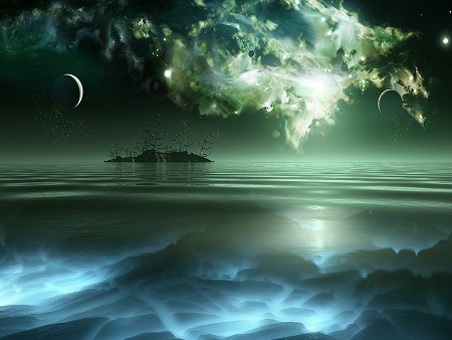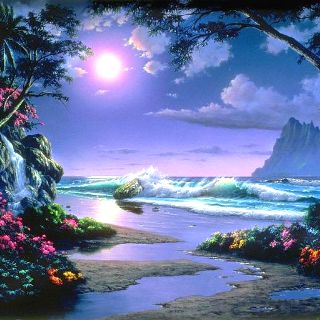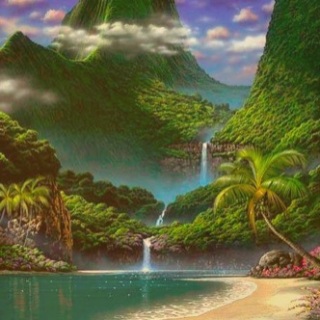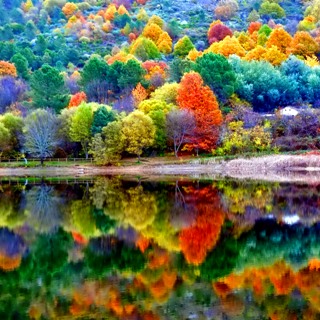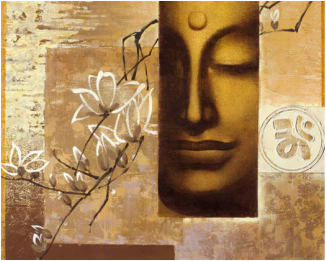Paradise Lost
“After the Fall, the state of divine consciousness was lost as well as the ability to see oneself as a soul encased in a wondrous body of consciousness, life force and atomic radiation. This was replaced by identification with the limitations of the gross physical form and the forfeiting of omniscient immortality and the paradise of Cosmic Consciousness.” ~ P. Yogananda (paraphrased) We were once gods – infinite, immortal beings in a state of endless bliss, with unlimited powers and knowledge. We could play in the playground of this universe in body-forms of our choice. We were co-creators who could manipulate the ubiquitous light energy and form them into new structures of “frozen light” to augment this magnificent universe of frozen light. We could leave this universe at will and roam as ecstatic beings of infinite consciousness. We were gods. Now we believe we are these mortal bodies. After so many lifetimes in these bodies, we have become accustomed to them. They are familiar to us. They appear to be our only form of existence. They offer some pleasures, loving relationships with family and friends, and occasional hints of control and power such that we become seduced into thinking that these lives are not so bad. Most humans chase after these pleasures, cling to love where they can find it, and search for some sense of meaningful control in their lives. For most, it ends badly. And then the process starts again, after a time of rest in an astral world. Each time, we are seduced into thinking it’s not so bad and then it turns out badly again. And our ego-minds have the ability to think that all the problems that are so prevalent in the world happen to the other guy, not to us. And then it does happen to us and we ask, “why me?” It is indeed a strange existence. And we keep coming back for more. The cosmic hypnosis of maya and avidya is a powerful force. “All the misery on the planet arises due to a personalized sense of “me” or “us.” That covers up the essence of who you are. When you are unaware of that inner essence, in the end you always create misery. It’s as simple as that. When you don’t know who you are, you create a mind-made self as a substitute for your beautiful divine being and cling to that fearful and needy self. Protecting and enhancing that false sense of self then becomes your primary motivating force.” ~ Eckhart Tolle “We human beings are what we have been for millions of years - colossally greedy, envious, aggressive, jealous, anxious and despairing, with occasional flashes of joy and affection. We are a strange mixture of hate, fear and gentleness; we are both violence and peace.” ~ Jiddu Krishnamurti. “As long as you are run by the egoic mind, you are part of the collective insanity. Perhaps you haven’t looked very deeply into the human condition in its state of dominance by the egoic mind. Open your eyes and see the fear, the despair, the greed, and the violence that are all-pervasive. See the heinous cruelty and suffering on an unimaginable scale that humans have inflicted and continue to inflict on each other as well as on other life forms on the planet. You don’t need to condemn. Just observe.” ~ Eckhart Tolle “It is a great marvel to me that, despite the fact that we are all the embodiments of the Divine, of God Himself, the most predominant trait of all human beings is that they so hatefully despise each other, and constantly criticize and seek to harm one another.” ~ Swami Abhayananda To help visualize just how far we have fallen from god to man, analogies can be helpful. Analogies are useful because our ego-minds have a hard time grasping such grand concepts any other way. The earlier account herein of Plato’s Cave bears repeating, at least the message anyway. As humans, we are like the prisoners chained in the depths of the cave whose sole existence for their entire lives is watching the shadows and light on the cave wall they are facing and hearing the sounds associated with these shadowy forms. As gods, we are like the prisoner who escaped from the chains and made the long climb up from the depths of the cave entrance and then into the sublime world outside the cave. One can imagine the euphoria that this escaped prisoner felt in discovering this world outside the cave – bright sunshine, cool breezes, vistas of mountains, forests, green and golden fields, lakes, rivers, waterfalls, oceans, etc. In an absolute blissful state, the escaped prisoner rushes back down into the cave to tell his fellow prisoners who are living their dim, shadowy existence deep in the cave. To his surprise, most of the prisoners are not interested in this glorious, magnificent existence available outside the cave. It doesn’t help that the words in the caveman language are woefully lacking to describe the world outside the cave. They just cannot relate to what this escapee is struggling to tell them. In fact, most think that the escapee’s adventure has turned him into a madman and a distraction. He is treated with disdain and possibly eliminated. The mystics of our world who, in all ages and in all lands, have re-discovered their original status as gods are like the prisoner who escaped from the cave into the sublime world beyond. Most humans do not have much interest in the words of the mystics. In fact, in many cases, particularly in the Western world, mystics have been persecuted and killed. Another analogy is a rather fanciful one, but perhaps useful just the same. Imagine there are two friends. In a fable-like way, imagine one gets turned into an ant. His friend is aghast – his poor friend is now an ant. He can see his ant-friend busily collecting crumbs and carrying them to his home. He feels immensely sorry that his friend has lost his glorious existence as a human. One day, he meets someone who tells him that his friend can be brought back to his original human form. To do so, the human friend must temporarily become an ant himself and tell his ant-friend the way to become a human again. And so it happens. The human friend, now temporarily in an ant form, tracks down his buddy and tells him what he must do to regain his human status. His ant-friend has no idea what this other ant is trying to tell him. The ant-friend has no recollection of once being human, has no idea what a human is, and firmly believes that he is an ant. He further believes that this other ant is a bit out of his mind, talking about all this crazy stuff. He tartly dismisses the ant and gets back to collecting his crumbs. He has a lot of work to do before the end of the day. We have all fallen from our original, glorious existence as gods (in this analogy, humans) and have become ant-like. Every once in a while, an enlightened being comes to tell us that we are not ants, we are gods. The vast majority of us cannot relate to such a silly concept and continue on with our ant-like existence, not interested in such craziness. Part of the problem is that people do not see the motivation to change. Suffering has not yet exceeded the return of sense pleasures. It is like the prisoners in Plato’s cave – they are comfortable with their existence, for the most part. Those few who have seen the outside of the cave and the splendors of that world compared to the dim two-dimensional cave existence, realize the meagerness of the cave life and would never go back. Similarly, those who have experienced the splendors of life as gods see the paltry existence as humans and would never go back unless they could retain their god-consciousness. “[God] can free souls only with their permission and cooperation ... [man has] such a delusive attachment to the instrumentality of a physical body that even if God were at this moment to offer liberation to the masses, I daresay not many would be eager to depart ... The body-identified sense-oriented are rigidly unconvinced that it is worthwhile to forgo known pleasure for the arcane bliss of Spirit. So many learning experiences must be undergone ...Earth, in the meantime, is the schoolhouse.” ~ P. Yogananda As well, there is the natural fear of the unknown. Even if someone describes an existence vastly superior to our current one, we are fearful of leaving the known for the unknown – no matter how great it sounds. Even if it was our original state of existence, it is now long forgotten. “[Ego], the unhappy self, or the unhappy me, becomes part of their sense of self or identity … They don’t want to let go because there is a fear that they will lose their sense of self.” ~ Eckhart Tolle And yet, as Henry David Thoreau has said, “the mass of men lead lives of quiet desperation.” But most seem comfortable in such an existence. It is a paradox. As Rumi has suggested, if only we could sample our lost paradise, we would do whatever was necessary to get there, i.e. “if the spiritual universe and the way to it were shown, no one would remain in this world for a single moment.” For some, this endless charade does become tiresome. Sickness, grief and a sense of having no control over these fragile body-forms over the course of many, many, many lifetimes causes them to question whether there might be something better. The god within cries out and is finally heard above the din of the endless chatter of the ego-mind. Then the search for the lost paradise begins. At the end of the search, the joy is unimaginable. “You are all gods, if you only knew it.” ~ P. Yogananda |

